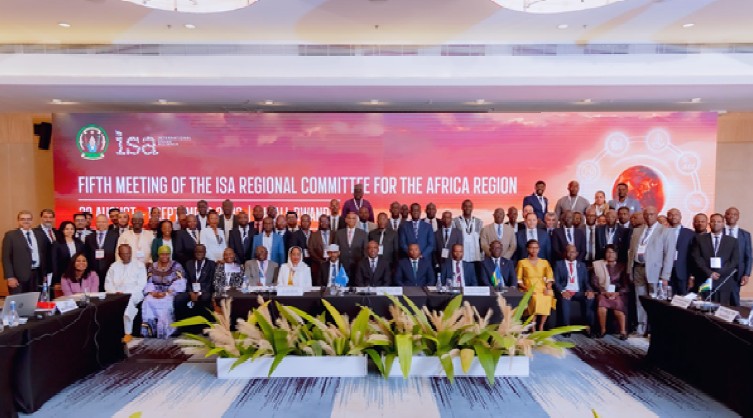ISA President Emphasises Global Solar Challenges and Solutions
By EPR Magazine Editorial November 2, 2023 1:53 pm IST
By EPR Magazine Editorial November 2, 2023 1:53 pm IST

Minister R.K. Singh Calls for Diverse Solar Manufacturing, Energy Storage, and Enhanced Efficiency in India.
The Union Minister for Power and New & Renewable Energy, R. K. Singh, who also serves as the President of the International Solar Alliance (ISA), stressed that achieving the Net Zero goal requires global cooperation to address challenges related to the lack of diversification in solar manufacturing capacity and supply chains. He made these remarks during the inaugural session of the one-day High-level Conference on New Technologies for Clean Energy Transition, held in New Delhi on November 1, 2023, on the sidelines of the Sixth Session of the International Solar Alliance Assembly. The conference was jointly organised by the Ministry of New & Renewable Energy of the Government of India, the Asian Development Bank, and the International Solar Energy Society.
Singh emphasised the critical role of energy storage in enabling greater utilisation of renewable energy and the provision of round-the-clock power. He noted that the lack of progress in energy storage and manufacturing capacity, coupled with overreliance on a single chemistry (lithium-ion), had created supply chain challenges, particularly evident during the COVID-19 pandemic. Singh asserted that without effective storage solutions, expanding renewable energy capacity would result in wastage, as excess energy generated during the day or from wind sources could not be effectively harnessed.
The ISA President acknowledged India’s rapid progress in energy transition but highlighted the challenges stemming from manufacturing capacity shortages. He called for investment and research into alternative chemistries for energy storage and the development of global manufacturing capacities. India has launched the Production Linked Incentive Scheme to promote the manufacturing of polysilicon, aiming to achieve 100 GW of manufacturing capacity for solar modules by 2030.
Singh also stressed the need for global collaboration in advancing solar technology, as most technological advancements have been concentrated in a single country. He advocated for increased efficiency in solar technology to reduce the cost of electricity, particularly in developing countries, where affordable access to electricity is a crucial goal.The ISA President emphasised the importance of financing for developing countries to facilitate energy access and transition. He called on developed countries to fulfill their commitments to finance green energy projects, citing the need for such funding to reach countries that require it.
Regarding India’s efforts, Singh mentioned that India, with its low per capita emissions, is committed to combating climate change. He highlighted India’s plans to expand its non-fossil-fuel capacity, aiming for 65 percent of established capacity to come from non-fossil fuels by 2030. Additionally, India is investing in green technologies, such as green hydrogen and green ammonia, with a significant manufacturing capacity of green ammonia in progress.
The High-level Conference on New Technologies for Clean Energy Transition aims to turn discussions into concrete actions. Attended by ministerial delegations from ISA member countries, policymakers, experts, and industry leaders, the conference seeks to foster collaboration, innovation, and knowledge sharing to drive tangible progress toward global climate objectives. The primary focus is on promoting solar energy as the preferred energy source to reduce carbon emissions, expand energy accessibility, and stimulate economic growth. The conference also marked the release of important reports related to solar technology and green hydrogen development.
We use cookies to personalize your experience. By continuing to visit this website you agree to our Terms & Conditions, Privacy Policy and Cookie Policy.